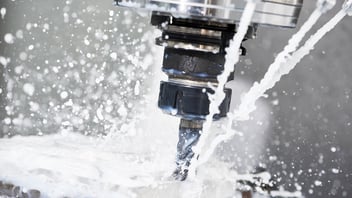When is Swiss turning chosen as a machining method?
Swiss turning is particularly suitable for long and thin-walled components with a high length-to-diameter ratio. It is also well-suited fo machining small components, such as screws.
This method ensures a highly precise result and tight dimensional tolerances, even for small parts. Therefore, Swiss turning is used when the manufactured component requires exceptional accuracy and stringent tolerances. It is an ideal method for producing precision components.
Swiss turning is a machining technique utilized across many industries. For instance:
- In medical technology, it’s used for manufacturing surgical instruments, needles, and implants.
- In the automotive industry, shafts are often produced using Swiss turning.
- It is also a suitable method for small components in the electronics industry and precision parts in the defense industry, thanks to its accuracy.
How does Swiss turning differ from conventional turning?
Swiss turning is a specialized machining method where the workpiece continuously moves against the tool. During machining, the workpiece moves longitudinally past the tool, unlike in conventional turning, where the tool moves around the workpiece.
Swiss turning typically utilizes CNC-based Swiss lathes, also known as Swiss-type automatic lathes. Key components of a Swiss lathe include:
- Bar feeder: Feeds the workpiece into the lathe.
- Guide bushings: Support the workpiece during machining, enabling high accuracy and surface quality. Guide bushings minimize vibration and deflection of the workpiece during the process.
The combination of a bar feeder and guide bushings ensures precise and efficient machining, resulting in high-quality outcomes.

What materials can be machined with Swiss lathes?
Swiss turning is compatible with various metal and plastic materials, including:
- Stainless steel
- Aluminum and aluminum alloys
- Brass
- Titanium
- Plastics such as polyacetal and polymethyl methacrylate
What to consider when choosing a partner for Swiss turning?
- Experience and specialization
Ensure the machine shop has expertise in Swiss turning, especially with the materials or components you require. - Equipment and capacity
Does the machine shop use modern CNC Swiss lathes and bar feeding systems? Modern equipment enables efficient and precise production, especially for small, high-tolerance parts. - Quality assurance
Swiss turning is often used for precision parts with tight tolerances. Check if the machine shop has certified quality systems (e.g., ISO 9001) and what quality assurance processes they follow. - Material expertise
Verify that the machine shop is proficient in handling the specific materials your product requires. This is particularly important for challenging materials, such as titanium. - High-volume production
If large production volumes are required, ensure the machine shop can handle the necessary scale efficiently and cost-effectively. Their production readiness depends on the size and capacity of their machine base.
>> Read the blog: Manufacturing precision parts requires special expertise
Mectalent offers comprehensive Swiss turning services
Mectalent’s equipment includes six Swiss-type automatic lathes, enabling a high production capacity. We can also handle series production through Swiss turning. With our capabilities, we can machine bars ranging from 2 mm to 32 mm in diameter.
At Mectalent, we have extensive expertise in precision mechanics and specialize in working within tight tolerances and high dimensional accuracy. In addition to Swiss turning, we offer a wide range of manufacturing and machining methods tailored to producing precision components.
>> Contact us to learn more about our Swiss turning services!



